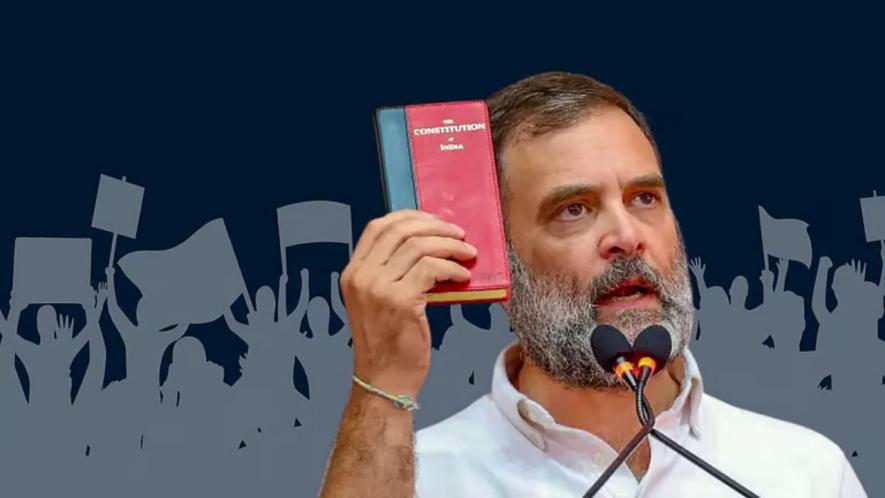Sambhal to Hathras: Rethinking Bar on Elected Representatives From Accessing Sensitive Areas

Following a violent clash in Sambhal, Uttar Pradesh, on November 24, 2024, the district administration passed an order under Section 163 of the Bharatiya Nyaya Sanhita (BNS), preventing any outsider from entering the district and declaring it a ‘sensitive area’. Thereafter, the Leader of Opposition (‘LOP’), Rahul Gandhi, announced that he was stopped from visiting the district and meet the victims’ families. This is similar to the time the Uttar Pradesh government stopped legislators belonging to the Indian National Congress party from visiting Hathras in the aftermath of the heinous rape and caste atrocity incident in 2020. In 2021, when Rahul Gandhi attempted to visit Lakhimpur Kheri following the massacre of farmers in the wake of the farmer’s protests, he was similarly prevented from doing so by the state government.The practice of preventing elected representatives from opposition parties from visiting such areas is not exclusive to the Uttar Pradesh government or the Bharatiya Janata Party ruled states. When BJP leaders sought to visit Sandeshkhali in West Bengal after reports emerged of widespread sexual harassment incidents in the region,, they were stopped by the state police on the pretext of public order.
I argue that elected representatives should be permitted access to sensitive areas where general public entry is prohibited and should be provided differential treatment when it comes to access. A failure to do so and an insistence on the complete prohibition of entry fails to consider the principles of legitimate expectations and proportionality. A more nuanced and well considered approach might be to regulate these visits more closely.
A breach of legitimate expectation
The doctrine of legitimate expectations is well-established in Indian jurisprudence on administrative law. In Union of India v. Hindustan Development Corporations (1993), the Supreme Court noted that the failure to consider and give due weight to citizens’ ‘legitimate expectations’ may lead to arbitrary decisions. The Court has also held that giving due consideration to such legitimate expectations was a part of reasonableness, a necessary corollary to the rule of law. A legitimate expectation can be inferred from a sanction of law, custom, or an established procedure followed in regular sequence.
In a democratic polity, elected representatives are expected to raise their constituents’ grievances in the legislature and hold the executive accountable if there is overreach. However, a prerequisite for the same is that the representatives have access to the primary source of information about any such event and be allowed to visit such areas and meet the victims and their families. This is an established procedure followed in regular sequence and a custom established by continuous practice. For instance, the LOP of India met the families of victims in Manipur, the LOP of West Bengal met the family of the RG Kar rape victim. and representatives from the ruling party met the family of the Hathras rape victim to assure them of necessary action and to personally gather information about the incidents.
Elected representatives should be granted access to sensitive areas to ensure democratic accountability and be allowed to meet victims' families, especially when public order can be maintained through alternative measures
While the doctrine of legitimate expectations has been used in different contexts until now, the Supreme Court has acknowledged that legitimate expectations may come in various forms and that an exhaustive list is not possible in the context of the vast and fast expansion of governmental activities. The conventional understanding of legitimate expectation can be expanded to include the legitimate expectations of citizens living in a democratic setup from their elected representatives and a reciprocal expectation of the representatives from the executive that they will be allowed to visit their constituents and assess the situation personally so that they can raise the grievance of their constituents in the legislature, and hold the executive accountable in case of foul play. Giving due consideration to these legitimate expectations mandates the carving of an exception for the elected representatives to visit the sensitive areas even where public order requires a general prohibition under Section 163 of BNS.
A violation of the proportionality principle
The doctrine of proportionality requires that any restriction on rights be no more drastic than necessary to obtain the desired result. The doctrine of proportionality is attracted in all its rigor, particularly, where a fundamental freedom is involved. In such instances, the courts can exercise primary judgment over the suitability of the restriction.
The doctrine of proportionality includes two tests: the necessity test, where the courts ask if there were no less restrictive measures that could have achieved the desired result, and the balancing test, where the court balances the competing interests.
The prohibition of elected representatives from visiting sensitive areas under Section 163 of the Bharatiya Nyaya Sanhita is disproportionate, as less restrictive measures could maintain public order while safeguarding democratic principles.
In the case of elected representatives visiting declared ‘sensitive areas’,, the executive bears a duty to maintain public order in the area after widespread violence. It is also empowered to pass an order under Section 163 of BNS to prohibit the entry of outsiders into the district. However, applying this general prohibition against elected representatives, including the LOP, who holds a constitutional position, is disproportionate.
The LOP had indicated his willingness to proceed to Sambhal alone, leaving the party workers and supporters to mitigate the possibility of a public order problem. He had requested to be taken to the area accompanied by police to mitigate the executive’s genuine concerns. But the executive rejected this proposal and insisted on completely prohibiting his entry. This is similar to the West Bengal police’s insistence on completely prohibiting entry of BJP leaders in Sandeshkhali despite their willingness to go unaccompanied by their followers and restricting various aspects of their visit to ensure there is no public order problem.
In a democratic setup, elected representatives have a legitimate expectation to access affected areas to assess situations and hold the executive accountable, which should not be curtailed by arbitrary restrictions.
This action fails the necessity test, as less restrictive measures such as limiting the number of people who could enter, limiting the time for which they could stay, and curbing any political activity or speech in the area could have ensured that a public order problem was not created. It also fails the balancing test, as there was a competing interest of democratic accountability that applied in the case of the elected representatives. The executive failed to balance these interests, sacrificing democratic accountability to maintain public order.
Carving an exception out of Section 163
The passing of prohibitory orders under Section 163 of BNS is general practice in India, following incidents that may threaten public order. While such orders may be justified in these circumstances, an exception must be carved out for the elected representatives of the affected areas and the LOPs to visit these areas, assess the situation, gather primary information, and engage with the victims.
This is simply because, in a democratic setup, elected representatives are duty-bound to raise their constituents’ grievances in the legislature and hold the executive accountable. How effectively they are able to discharge this obligation depends upon their ability to visit the affected areas.. There is a legitimate expectation from the administration that this process of democratic accountability will not be curtailed. Failing to honor these legitimate expectations could amount to an abuse of administrative power. The status of an individual as an elected representative is an essential factor to be considered before access can be denied to him, and a failure to consider the relevant factor suggests the non-application of mind in the best-case scenario. In the worst-case scenario, it suggests mala fide action to evade democratic accountability and conceal the incident’s facts.
Such visits, however, can be subject to proportionate restrictions. Under the “balancing test,” the public interest in ensuring democratic accountability must be balanced against the maintaining of public order, and thereafter, the least restrictive conditions can be imposed on such visits under the “necessity test.” For instance, the administration can take measures to ensure that the visitors do not intimidate the witnesses, the evidence is not tampered and the site of the violence is untouched by the visits so as to ensure that a forensic investigation is effectively conducted. The visits therefore, can be under the supervision of the administration and within the guidelines provided by them to avoid such possibility.
Hamza Khan studies law at NALSAR, Hyderabad and is interested in international criminal law and public policy.
Get the latest reports & analysis with people's perspective on Protests, movements & deep analytical videos, discussions of the current affairs in your Telegram app. Subscribe to NewsClick's Telegram channel & get Real-Time updates on stories, as they get published on our website.























